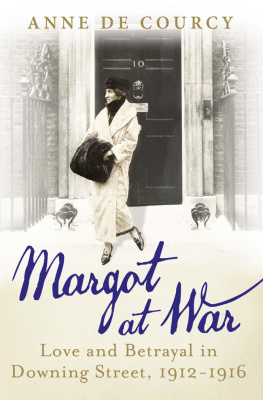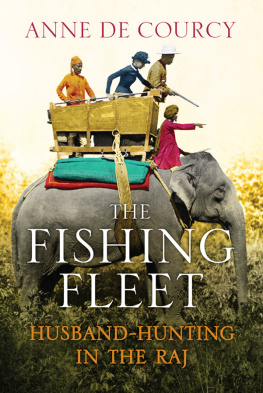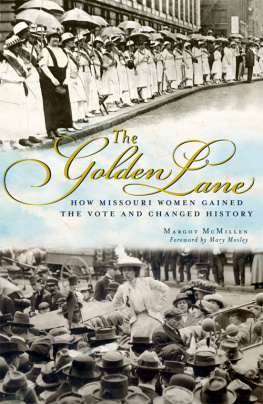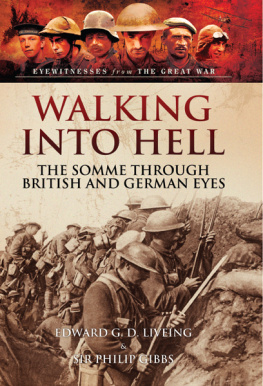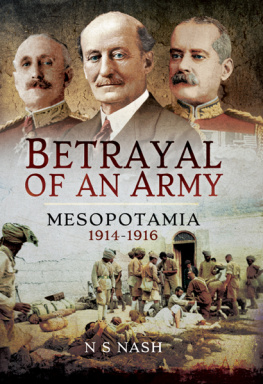Anne de Courcy - Margot at War: Love and Betrayal in Downing Street, 1912-1916
Here you can read online Anne de Courcy - Margot at War: Love and Betrayal in Downing Street, 1912-1916 full text of the book (entire story) in english for free. Download pdf and epub, get meaning, cover and reviews about this ebook. year: 2014, publisher: Orion, genre: Non-fiction. Description of the work, (preface) as well as reviews are available. Best literature library LitArk.com created for fans of good reading and offers a wide selection of genres:
Romance novel
Science fiction
Adventure
Detective
Science
History
Home and family
Prose
Art
Politics
Computer
Non-fiction
Religion
Business
Children
Humor
Choose a favorite category and find really read worthwhile books. Enjoy immersion in the world of imagination, feel the emotions of the characters or learn something new for yourself, make an fascinating discovery.
- Book:Margot at War: Love and Betrayal in Downing Street, 1912-1916
- Author:
- Publisher:Orion
- Genre:
- Year:2014
- Rating:4 / 5
- Favourites:Add to favourites
- Your mark:
- 80
- 1
- 2
- 3
- 4
- 5
Margot at War: Love and Betrayal in Downing Street, 1912-1916: summary, description and annotation
We offer to read an annotation, description, summary or preface (depends on what the author of the book "Margot at War: Love and Betrayal in Downing Street, 1912-1916" wrote himself). If you haven't found the necessary information about the book — write in the comments, we will try to find it.
Margot at War: Love and Betrayal in Downing Street, 1912-1916 — read online for free the complete book (whole text) full work
Below is the text of the book, divided by pages. System saving the place of the last page read, allows you to conveniently read the book "Margot at War: Love and Betrayal in Downing Street, 1912-1916" online for free, without having to search again every time where you left off. Put a bookmark, and you can go to the page where you finished reading at any time.
Font size:
Interval:
Bookmark:
MARGOT
AT WAR
LOVE AND BETRAYAL
IN DOWNING STREET
191216

Anne de Courcy
Weidenfeld & Nicolson
LONDON
CONTENTS


SECTION ONE
SECTION TWO

Most books have at least one raison dtre. Mine is a fascination with Margot Asquith her originality, wit, chic, vitality, the intensity of her emotions, often so forcefully expressed and the drama of her last five years as Prime Ministers wife during a time that is one of the most important in our history.
Margot was someone who had created herself and her own path through life. She was largely self-educated, with a passion to learn more. In an era when Society was narrow, close-knit and aristocratic, Margot, a tradesmans granddaughter, surmounted by sheer force of personality the invisible stockade that surrounded this elite to arrive at its inner heart, dispensing en route with any of its conventions such as chaperonage that she considered meaningless.
But what she really enjoyed was the conversation of the highly intelligent; and by the time she was twenty-five, she was friends with most of the cleverest men in the country. Gladstone, who wrote a poem to her, sat her on his knee; Oscar Wilde dedicated a story to her; admirers wrote to her daily; the great Benjamin Jowett, Regius Professor of Greek and Master of Balliol College, Oxford, advised her on what to read and whom to marry. No beauty in an age of beauties, she compensated for her lack of looks by superb, stylish clothes. Although she was so sought after, suitors courted her unavailingly for nine years she was deeply in love with a glamorous neer-do-well with whom she saw no future but whom she could not bring herself to leave.
By now, as the fabulous Miss Tennant, she was so well known that when a rumour swept London that she was going to marry Arthur Balfour, soon to be Prime Minister, he denied it with the words: No, that is not so. I rather think of having a career of my own. Her impact on the politician H.H. Asquith, then the Liberal Partys rising star and a married man with five children, was immediate, so that within months of his wifes death from typhoid he was pursuing her passionately.
His courtship of her reveals a man far different from the cool, bland, almost dull, imperturbability usually presented as his persona. His letters are those of someone intensely romantic, besottedly in love, raised to the heights then agonised as she blew first hot, then cold. Upon my knees, which I bend too rarely to God, I implore you to think twice and thrice before you shut the door... for your love is life, and its loss black despair, he wrote after one of her rejections.
By the time she married him, Asquith had become Home Secretary, the man tipped to be a future prime minister. Margots gift for friendship and her constant entertaining introduced the entire Asquith family to a life in which politicians, aristocrats, literati and churchmen gathered daily round the luncheon or dinner table. It was a world where politics was entertainment as well as government, with the wives, daughters, friends and sisters of politicians spending their afternoons in the Ladies Gallery and discussing the speeches afterwards at the various dinner parties they would be attending.
In these intimate gatherings, as in bedrooms and drawing rooms all over London, secrets were told, decisions were taken, allegiances subtly shifted and gossip passed round, with the running of the country largely in the hands of this small, powerful group. Although there were no women politicians, female influence could be powerful. Lady Campbell-Bannerman (the wife of Asquiths predecessor as Prime Minister) refused to let her husband accept a peerage; Margot herself often wrote to ministers in her husbands Government to congratulate, chide or give her own views; Clementine Churchill tried to intervene on behalf of Winston when she felt he had been unfairly treated.
The two years immediately before the 191418 war (the fifth and sixth of Asquiths premiership), where my story of the Asquiths begins, are as important as any in British history. Though for the privileged the glossy surface of life seemed unaltered, just as ice can crack beneath an unbroken covering of snow so huge changes were in motion to alter entirely the world as they knew it.
The year 1912 saw the fledgling Welfare State and a Labour Party emerging as a political force. There was constant industrial unrest as workers fought against their poor pay and conditions. The suffragette movement had turned to militancy: who now could imagine a prime minister beaten about the head, as Asquith was, by women armed with hunting crops or attacked on a golf course by two who tried to strip him?
Though the vote was still elusive, there was a steady flow of women away from domestic service and into offices, where the new fashions skirts had risen above the ankle for the first time in centuries enabled them to climb the stairs of omnibuses and, if suffragettes, to flee their pursuers more successfully. Widening horizons still further was the steady increase in newspaper readership, though nobody, if the evidence I have collected from diaries and letters from around the country is to be believed, saw the war coming. Instead, all attention was focused on the question of Home Rule for Ireland, almost as bitterly divisive in the political classes of England as it was in Ireland.
The violent emotions that accompany profound social change were reflected in the personal lives of those inside No. 10. Against the background of a Government beset by troubles and the looming possibility of a civil war, Asquith fell in love. The object of what became an obsessive passion was his daughter Violets best friend, Venetia Stanley, a young woman aged twenty-five to his sixty. When Margot discovered her Henrys new attachment her diary is filled with misery. To add to the torrent of emotion coursing through Downing Street, one of Asquiths Private Secretaries was also in love with Venetia, another with Violet, while Violet and Venetia were themselves locked in a friendship with near-erotic undertones. To add to Margots difficulties, her relationship with her husband was already complicated by Violets jealous, almost incestuous adoration of her father and insistent, constant presence (I have only been alone with Henry and my children three weeks in nineteen years, Margot wailed to a friend).
The outbreak of war only increased Asquiths passion for Venetia, and the letters multiplied. Picture the Prime Minister, sitting in Cabinet as great questions of strategy are discussed, while young men are dying in their thousands in the trenches, when a messenger brings in a letter. It is from Venetia. Immediately he opens it, reads it with the utmost concentration, picks up his pen and writes several pages quite probably containing a Cabinet secret with equal concentration while discussion continues around him, sends for the messenger and dispatches his answer. Then, and only then, does he rejoin the discussion.
Looked at closely, almost everything about those few years seems strange to us. It was a war that for the first seventeen months was run almost entirely on a voluntary basis (except for the requisition of horses). Much war work was done by children: Girl Guides worked in soup kitchens, filled sandbags, padded splints for broken limbs; Boy Scouts acted as messengers in the War Office.
Next pageFont size:
Interval:
Bookmark:
Similar books «Margot at War: Love and Betrayal in Downing Street, 1912-1916»
Look at similar books to Margot at War: Love and Betrayal in Downing Street, 1912-1916. We have selected literature similar in name and meaning in the hope of providing readers with more options to find new, interesting, not yet read works.
Discussion, reviews of the book Margot at War: Love and Betrayal in Downing Street, 1912-1916 and just readers' own opinions. Leave your comments, write what you think about the work, its meaning or the main characters. Specify what exactly you liked and what you didn't like, and why you think so.

